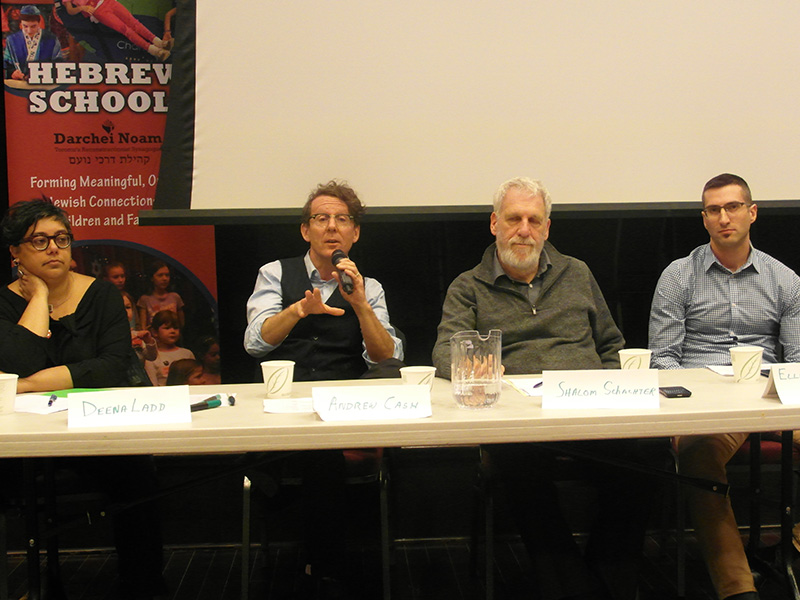As the public awaits the Ontario government’s recommendations for workplace reform, a panel of advocates gathered on April 23 in Toronto to champion forceful new measures.
The Changing Workplace Review’s final report, expected in May, could signal once-in-a-generation legislative changes around part-time and contract work, often termed “precarious employment.”
“With more than half of the workers in the GTA and Hamilton in this situation, it’s the new workplace and the new work-life reality,” said Laurel Rothman, chair of Congregation Darchei Noam’s Social Justice Advocacy Committee, which hosted the event.
The panel featured former Toronto MP Andrew Cash, founder of the Urban Worker Project; Deena Ladd, a founder of the Toronto Workers’ Action Centre and Shalom Schachter, a Toronto labour lawyer and ordained rabbi who is the Toronto Board of Rabbis’ representative to the Interfaith Social Assistance Reform Coalition.
READ: ONLY THE ‘RADICAL LEFT’ BELIEVES JEWISH MEDIA IS SHIFTING TO THE RIGHT
Policy advisor Elliot Siemiatycki moderated the discussion, which was attended by about 50 people.
Decades ago, labour issues might have gained easy traction in the Jewish community. But as community voting patterns have shifted rightward and the general cultural climate has become polarized, issues like precarious employment don’t hold quite the same sway as they used to.
‘precarious employment is negatively affecting family formation and size, and thus one important element of Jewish continuity,
Yet Schachter said the proposed changes would benefit more than “a small group of self-interested labour bosses.”
“It is true that the leadership of the Jewish community is no longer as representative of the spectrum of political opinion in the province as it used to be,” he added in an email. “However, the issue of precarious employment cuts across all religious, ethnic and ‘class’ lines.
Precarity is the norm for all young adults into their 20s and even 30s. Moreover, professionals who used to have job security now see that their work is contracted out and they are only able to work in temporary or contract jobs.”
Last fall, 20 Ontario rabbis signed a statement supporting the “Fight for $15 and Fairness,” which supports a minimum wage of $15, among other measures.
Precarious employment, said Schachter, has been discussed at meetings of the Toronto Board of Rabbis.
“There is an understanding that more and more of the Jewish community are falling into poverty levels of income. There is also a recognition that precarious employment is negatively affecting family formation and size and thus one important element of Jewish continuity,” he said.
With the Liberal government focusing its attention on the workplace, activists see an opportunity to roll back gains made by neoliberal economic policies that they believe come at the expense of workers.
“There’s been a number done on people,” said Ladd, who has been advocating for workers for 25 years. “People have been trained to be entrepreneurial, that a permanent job is a thing of the past.… This speaks to the whole issue of political education.”
While she is consistently impressed by the resilience of people she meets in the field, many are “depressed and beaten down.” The solution, she said, is “rebuilding a labour movement and social justice movement.”
Cash has seen the labour market from both sides. As a freelance writer and Juno and SOCAN award-winning musician, he lived the precarious life. But he and his wife, who’s also a freelancer, considered themselves “middle class in the arts and culture sector.”
That all changed in 2009, when their child was diagnosed with a rare disease. They were unable to work and, without employment benefits, they fell into debt that took two years to crawl out of.
Cash gradually realized how prevalent precarious employment had become in many industries and adopted the issue once he was elected, in 2011.
“I thought it was a corner of the market where all the ne’er-do-wells went who didn’t want a boss,” he said. “But I realized this was starting to happen, not only among the ne’er-do-wells, but all over the place.”
Those places now include the public sector. The federal government, he said, is the largest user of temporary help agencies, and a string of stories in the past few years has detailed the growth of contract work in the Ontario government.
Contract workers teach almost half the classes in Ontario post-secondary institutions, with no access to sick days.
“There’s a reflex on the left to target private sector employers,” he said, “but if public sector employers are actually leading the race to the bottom, then we have a much more serious issue than we think.”
